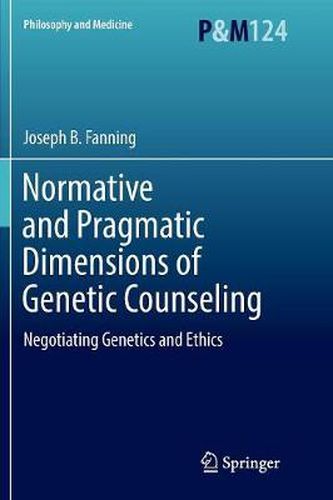Readings Newsletter
Become a Readings Member to make your shopping experience even easier.
Sign in or sign up for free!
You’re not far away from qualifying for FREE standard shipping within Australia
You’ve qualified for FREE standard shipping within Australia
The cart is loading…






This title is printed to order. This book may have been self-published. If so, we cannot guarantee the quality of the content. In the main most books will have gone through the editing process however some may not. We therefore suggest that you be aware of this before ordering this book. If in doubt check either the author or publisher’s details as we are unable to accept any returns unless they are faulty. Please contact us if you have any questions.
This book provides an elaboration and evaluation of the dominant conceptions of genetic counseling as they are accounted for in three different models: the teaching model; the psychotherapeutic model; and the responsibility model. The elaboration of these models involves an identification of the larger traditions, visions and theories of communication that underwrite them; the evaluation entails an assessment of each model’s theses and ultimately a comparison of their adequacy in response to two important concerns in genetic counseling: the contested values of non-directiveness and the recognition of differences across perspectives, with special focus on how religious and spiritual beliefs of patients are coordinated with the networks of meaning in genetics. Several insights are made explicit in this project through the work of Robert Brandom. Brandom’s deontic scorekeeping model demonstrates how dialogue is at the root of grasping a conceptual content. Against this backdrop, professional communications such as genetic counseling can be seen as late developments in linguistic practices that have structural challenges. Brandom’s model reminds us that the professional needs the client’s understanding to grasp conceptual content in a particular context.
$9.00 standard shipping within Australia
FREE standard shipping within Australia for orders over $100.00
Express & International shipping calculated at checkout
This title is printed to order. This book may have been self-published. If so, we cannot guarantee the quality of the content. In the main most books will have gone through the editing process however some may not. We therefore suggest that you be aware of this before ordering this book. If in doubt check either the author or publisher’s details as we are unable to accept any returns unless they are faulty. Please contact us if you have any questions.
This book provides an elaboration and evaluation of the dominant conceptions of genetic counseling as they are accounted for in three different models: the teaching model; the psychotherapeutic model; and the responsibility model. The elaboration of these models involves an identification of the larger traditions, visions and theories of communication that underwrite them; the evaluation entails an assessment of each model’s theses and ultimately a comparison of their adequacy in response to two important concerns in genetic counseling: the contested values of non-directiveness and the recognition of differences across perspectives, with special focus on how religious and spiritual beliefs of patients are coordinated with the networks of meaning in genetics. Several insights are made explicit in this project through the work of Robert Brandom. Brandom’s deontic scorekeeping model demonstrates how dialogue is at the root of grasping a conceptual content. Against this backdrop, professional communications such as genetic counseling can be seen as late developments in linguistic practices that have structural challenges. Brandom’s model reminds us that the professional needs the client’s understanding to grasp conceptual content in a particular context.